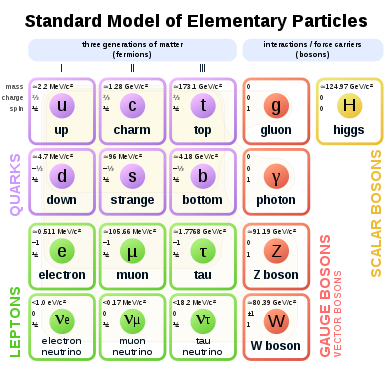Gaugino
In supersymmetry theories of particle physics, a gaugino is the hypothetical fermionic supersymmetric field quantum (superpartner) of a gauge field, as predicted by gauge theory combined with supersymmetry. All gauginos have spin 1/2, except for gravitino (spin 3/2).
| Standard Model of particle physics |
|---|
 |
|
Scientists Rutherford · Thomson · Chadwick · Bose · Sudarshan · Koshiba · Davis Jr. · Anderson · Fermi · Dirac · Feynman · Rubbia · Gell-Mann · Kendall · Taylor · Friedman · Powell · P. W. Anderson · Glashow · Iliopoulos · Maiani · Meer · Cowan · Nambu · Chamberlain · Cabibbo · Schwartz · Perl · Majorana · Weinberg · Lee · Ward · Salam · Kobayashi · Maskawa · Yang · Yukawa · 't Hooft · Veltman · Gross · Politzer · Wilczek · Cronin · Fitch · Vleck · Higgs · Englert · Brout · Hagen · Guralnik · Kibble · Ting · Richter |
In the minimal supersymmetric extension of the standard model the following gauginos exist:
- The gluino (symbol
g͂
) is the superpartner of the gluon, and hence carries color charge. - The gravitino (symbol
G͂
) is the supersymmetric partner of the graviton. - Three winos (symbol
W͂±
and W͂3) are the superpartners of the W bosons of the SU(2)L gauge fields. - The bino is the superpartner of the U(1) gauge field corresponding to weak hypercharge.
Sometimes the term "electroweakinos" is used to refer to winos and binos and on occasion also higgsinos.[1]
Mixing
Gauginos mix with higgsinos, the superpartners of the Higgs field's degrees of freedom, to form mass eigenstates called neutralinos, which are electrically neutral, and charginos, which are electrically charged.
In many supersymmetric models, the lightest supersymmetric particle (LSP), often a neutralino such as the photino, is stable. In that case it is a WIMP and a candidate for dark matter.
See also
References
- Gori, Stefania; Jung, Sunghoon; Wang, Lian-Tao; Wells, James D. (2014). "Prospects for electroweakino discovery at a 100 TeV hadron collider". Journal of High Energy Physics. 2014 (12): 108. arXiv:1410.6287. Bibcode:2014JHEP...12..108G. doi:10.1007/JHEP12(2014)108.
- G. Bertone; D. Hooper; J. Silk (2005). "Particle Dark Matter: Evidence, Candidates and Constraints". Physics Reports. 405 (5–6): 279–390. arXiv:hep-ph/0404175. Bibcode:2005PhR...405..279B. doi:10.1016/j.physrep.2004.08.031.